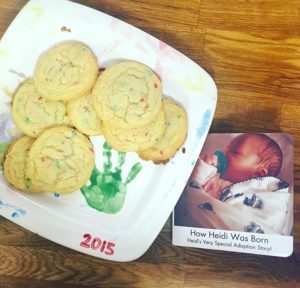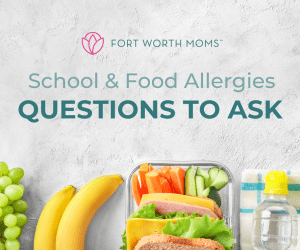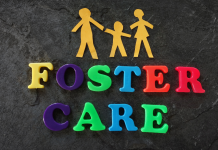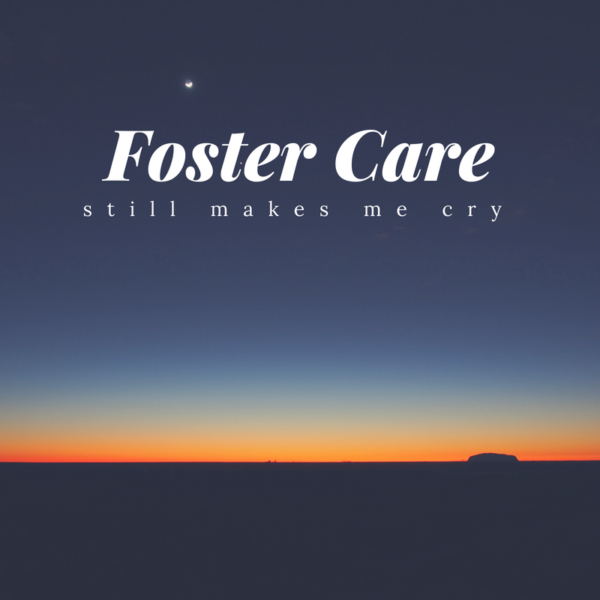We’ve been rapid fire checking off milestones with my 2.5 year old daughter: first ballet class, first sleepover. We have a copy of Finding Nemo at home and the influence of Heidi’s peers at day school showed itself when she came home a few weeks ago wanting to go see “The Dory Movie.” Although it’s not my Disney favorite, I was willing to consider taking her for a first movie.
As I tried to get my act together to plan our trip, I saw some discouraging posts from the adoptive family community on Finding Dory‘s plot to be reunited with her family. Self-discovery is one of the most common themes in writing, and the journey of self-discovery through finding or reconnecting with one’s birth family is low hanging fruit. The challenge lies in incorporating classic storytelling into the fabric of our society, where more than 400,000 U.S. children are in the foster care program and many families, like my own, are made through adoption. I was soon sitting in the theater for Finding Dory, with my husband and a notepad next to me instead of my toddler, learning for the first time how to balance popular culture with my daughter’s intricate story.
>> JOIN TODAY :: Dallas Adoptive & Foster Moms <<
From the beginning of our adoption process, my husband and I have worked to separate any personal fears from our family’s attitude towards adoption. Our adoption agency, Adoption Advocates, is one of the leading agencies for open adoption in the United States, meaning stateside adoptions where the birth parents and adoptive parents know each other’s identities and can foster communication with each other as they see fit. Adoption Advocates reminded us that raising a child with less fear and more transparency makes a thriving adult, which is why I felt encouraged to reach out to their executive director, Rory Hall, about my questions from Finding Dory.
- Everyone’s adoption and birth parent story is unique, and when one is represented in a story as popular as Finding Dory, it can risk being seen as how every story should be. How do you encourage adoptive parents to help their children understand their personal stories? How do you start discussions with children on the media and truth in adoption? First, we encourage families to put together life books. Kids love books. You can start bringing it out as soon as they can start holding a book. It’s important that the adults bring up adoption topics and facilitate discussion because kids sometimes don’t know to do that. Ask your child questions! Make statements to see how they react. Having a conversation after seeing the movie and asking questions can help facilitate the discussion. If the adult sees there are discrepancies, explain your views to the child in their developmental level to encourage discussion.

- In Finding Dory, Dory feels guilt and shame that her short-term memory loss and curiosity played a role in being separated from her parents. How can we free adopted children for thinking they are responsible for their unique stories? By talking about it early. We encourage our parents to go back to the principles we teach in our free open adoption education seminars. The adoptive parents control the story from the beginning. Until they reach a certain developmental level, the use of religion, destiny, “the judge said so,” etc. works well. Once they get older, discussions can take place about finances, unplanned pregnancies, and the realities of why birth parents make the decisions they do out of love.
- Finding Dory ends with Dory and her parents making a new version of their family with Nemo and Marlin. Open adoption is different for every family, and very rarely means everyone living together. How can adoptive parents share with their children what the boundaries or circumstances are in the relationship with their birth parents in a positive way? There are a lot of books today on how families are made and can be different. It’s best to always talk about birth parents in a positive light and that they made the decision out of love. If there are some negative things in the parents’ backgrounds, you wouldn’t tell them until they are older and can still separate the negative from the love they had for the child.
Recommended reading from Adoption Advocates on the topic of open adoption and facilitating healthy conversations with your children includes “Adoption Without Fear” and “How to Talk so Your Kids Will Listen and Listen So Your Kids Will Talk”.
Being able to speak with a professional on themes from Finding Dory reminded me that choosing honesty and positivity at home when discussing our family’s story diminishes fear when we see other versions of a family in society or popular culture. While I would love to think my child won’t ever face reckonings of her life story in comparison to others, it’s not true for any of us.
I was mostly grateful to have the experience of my daughter wanting to see a movie I knew nothing about early in life as a reminder that I am the editor in chief of her life – and that I owe it to her and to me to read up on new books and movies she may be exposed to so I know how to facilitate the best discussions and learning opportunities from them. At the end of the day, I loved Finding Dory and its themes of new definitions of family, keeping a positive attitude through challenges, and learning that we are all made differently without fault or being less than others.
While families may continue to look different in the media, it only makes me more proud of our family’s unique story and what a special fate it was for us all to be brought together.














Wonderful and thoughtful post, LIlly. You are a good mom! (And thanks for linking to my old guest post!)
Wonderful post Lilly! Thank you from all adoptive Moms. We need to hear much more on these topics!